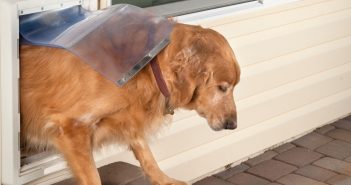About 3 in 10 allergy sufferers are allergic to cats or dogs (with cats being the more common culprit). But that doesn’t always stop people from having a four-legged friend in their home. Whether you’ve had allergies for a long time or you’ve only discovered them after getting a pet, they can wreak havoc on your system.
From sneezing to itchy, watery eyes, pet dander can trigger a lot of unpleasant symptoms for someone with allergies. But, once a dog or cat becomes a part of your family, it’s not as though you can just get rid of them, right? So, what can you do?
Thankfully, there are many ways to reduce the impact of pet dander in your home. Keeping some rooms “off limits” is always one way to go, but if you want your pets to be able to roam freely around your house, you can take a few extra steps to eliminate allergens in the air and on different materials, so you can breathe easily around your furry best friend.
Dealing With Dander
Contrary to popular belief, pet allergies don’t come from pet fur. Rather, they come from saliva, urine, and dander. Dander is actually nothing more than flecks of skin that shed off a dog or cat, similar to dandruff in humans.
Unfortunately, it’s easy for dander to get attached to a variety of materials, from furniture fabric to bedding, and even your clothes. It can also transfer from one material to another. When you’re around these allergy triggers, you can start to feel symptoms like itchy, watery eyes. And if you have dander on your hands and rub your eyes, it can make matters even worse!
While it might be impossible to get rid of allergens in the air and on materials completely, there are preventative measures you can use to reduce the amount of dander in your home whether you use contacts, glasses, or no corrective measures at all:
- Wash your hands frequently.
- Wash your face.
- Wash your clothes, blankets, towels, and other fabrics often.
- Keep windows and doors shut to prevent allergens from outside from coming in.
Again you can “pet-proof” certain areas of your home, too. For example, if you want to keep your dog or cat out of your bedroom or home office, consider putting up a baby gate. Keeping your bedroom free of pet dander will make it easier to get a restful sleep at night without being bothered by allergy symptoms.
Keep Your Air Clear to Keep Your Sinuses Clear
The air quality of your home, as well as using the right products to keep your home clean, can make a big difference in how often your pet allergies flare up. How much attention do you pay to your air conditioning and heating units? If it’s been a while since you changed the filter, it could be part of the reason you’re sneezing so much lately.
When you have a dirty air filter, your HVAC system can’t run as efficiently. It has to work overtime to provide the same output as it would with a new/clean filter. Changing the filter every three months or so will extend the life of your HVAC system, while keeping the air cleaner. People who suffer from allergies can really benefit from the installation of a HEPA filter. HEPA filters are better at absorbing particulates in the air. So, dander gets “trapped” in the filter, and less of it goes out into the air of your home for you to breathe.
You can also make traveling with your pet easier by changing your car’s cabin air filters from time to time, especially if your four-legged friend rides shotgun with you frequently.
Keeping your home as clean as possible is a great way to reduce allergy symptoms, but be aware of the products you’re using. Some pet carpet deodorants and even pet hygiene products can contain allergens and irritants that can cause problems like:
- Runny nose
- Itchy eyes
- Coughing/wheezing
- Trouble breathing
- Itchy throat
Stop Snuggling, Stop Sneezing
We mentioned it above, but avoiding the things that trigger your allergies is one of the best ways to go if you’re trying to reduce the effects of your symptoms. That’s easier to do for things like pollen and dust than it is for a family pet.
While you shouldn’t stop showing your pet affection, keeping some of these allergy-proofing tips in mind can make it easier for you both to share your space safely, without having to feel miserable due to allergy symptoms.
Keep your home clean, keep certain rooms off limits, and make sure you’re taking advantage of clean air options for your house. When you put in a little extra effort to get rid of pet dander, both you and your furry family member will benefit.
Having good air quality indoors overall is good for you and your pet. For additional information in a broader sense check out John Hughes’ article all about the importance of (and how to improve) your indoor air quality.





1 Comment
Good ideas listed! Thank you!